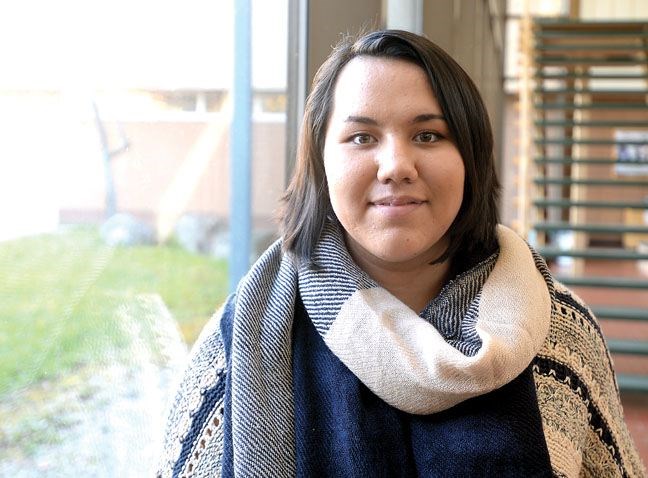The writing assignment started with one simple sentence: "I have places where all my stories begin."
When Keisha McKenzie read American author Barbara Kingsolver's words, she knew where her own story should start.
"One is a cramped town called Hazelton," she wrote. "The wind loved to dance to the beating drums and children chuckled often. Sadly, fists also flew to the beating drums and children screamed in dark ghastly corners. It's peculiar how something can be so alluring, but be filled with resentment. Here I feel absent from the luminous sun."
With those words the Prince George secondary school graduate became one of nine winners in the youth competition for the 'Ut'loo Noye Khunni ~ Weaving Words Celebration, an aboriginal storytelling festival that ends Saturday.
Seated at Vanier Hall with more than 400 other students, McKenzie watched a video of herself performing the short story - a nerve-wracking experience for the shy 17-year-old.
"It was really personal for me to release it," said McKenzie. "I kind of look at it as my way of healing from my past, look at it in a better light, being thankful for the things that did happen in my hometown."
For years she was embarrassed about growing up on the Gitanmaax reserve in Hazelton, which she left to live with her mother in Prince George at age 10.
Not anymore.
In the story, she describes the time as "bittersweet" and she ends it by recalling the moments that make her thankful.
"There is always someone to lean on in this small community," she wrote, later suggesting painful experience can lead to something better. "If we didn't know what heartache felt like, we wouldn't know what happiness looked like."
Many misunderstand the realities on reserve, McKenzie said, and often only choose to see the bad.
"I feel like a lot of my friends anyway look at First Nations as unsuccessful people," said McKenzie, who is doing a two-year arts degree at the College of New Caledonia. "It doesn't matter your background, you can have a good education, a good career."
Aboriginal writers must take charge of telling their own stories, visiting author and journalist Waubgeshig Rice told the audience.
"I think it's the best way to educate Canadians about our culture but also help ourselves learn about each other," he told the audience.
"It just takes one of us to have the courage to stand up."
McKenzie's Writing 12 teacher Heather Marren-Reitsma called the work "brilliant."
"I always know when kids have the gift," she said. "You can feel it, it moves you inside. It's one of those moments when you're reading something - English teachers understand - everything else in the world shuts away and then you just focus on that moment because the writing is so strong that it grips you completely."
This year School District 57's aboriginal department partnered with the event, garnering more than 100 youth submissions when there was less than 10 the year before.
"You are all storytellers," said aboriginal education worker Tessa Fraser before a video presentation showed the youth authors reading their work. "It can be drumming. It can be dancing. It can be singing."
Ten-year-old Avee Boyle tells her stories both in body movement and in bold sentences.
An avid dancer, Boyle, who won for her age category, wrote of the nerves and preparation surrounding her first dance competition performing to The Lion Sleeps Tonight.
"I didn't want to be a lion because in ballet I thought of the pretty dress," recalled Boyle. "After, my mom told me that the lion represents courage and strength."
Boyle said her favourite part was playing with other sounds in the story, like the ding of a bell, or humming the tune of her song.
To finish the first-person narrative, Boyle wrote that she still embodies that character: "Today I have the courage and strength of a lion. I take risks, try new things, and have grown as a dancer and person."



